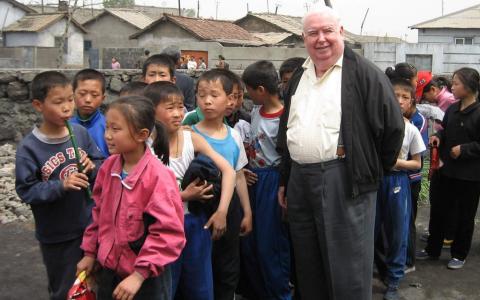
The Maryknoll Office for Global Concerns joined a number of organizations in sending the following letter to House leadership asking Congress to include humanitarian assistance for North Korea in the next COVID-19 relief bill.
May 5, 2020
Dear Speaker Pelosi and House Minority Leader McCarthy,
We write to you out of concern for the well-being of ordinary people in North Korea at risk of infection by COVID-19 or suffering due to the economic difficulties of extended quarantine. Nongovernmental organizations providing life-saving humanitarian assistance face significant barriers to meeting these needs and addressing the devastating potential for COVID-19's spread within the country. We, therefore, urge you to address these obstacles to life-saving work in the next legislative relief package related to the pandemic.
While official reports from North Korea claim there are no cases of COVID-19, the situation remains precarious. Roughly 100,000 cases have been confirmed in China and South Korea combined, and while North Korea has closed its borders, its proximity to these countries leaves it extremely vulnerable to an outbreak.
Underlying vulnerabilities make this potential outbreak even more dangerous. Prior to the country closing its borders to stymie the pandemic, the United Nations indicated that roughly 10.1 million people in North Korea are in urgent need of food assistance. Additionally, 10.4 million are in need of nutritional support and better access to health care, clean water, and the sanitation and hygiene facilities necessary to prevent the spread of infectious diseases like COVID-19.
Humanitarian aid, already subject to a long and complex approval process, has been further delayed by quarantines and border closings. It is urgent that the U.S. remove additional barriers to humanitarian aid so that nongovernmental organizations can respond with speed and flexibility not only to a potential pandemic in North Korea but also to the underlying needs exacerbated by this crisis.
For this reason, we were pleased to see the recent announcement by Representative Andy Levin and Senator Ed Markey publicly releasing the text of the Enhancing North Korea Humanitarian Assistance Act (ENKHA). The bill has full support from NGOs including those that have provided humanitarian assistance to North Korea for decades.
The bill addresses many of the most pressing challenges for nongovernmental humanitarian agencies and clarifies existing sanctions exemptions for these organizations.
While sanctions are not intended to interfere with the delivery of humanitarian assistance, in practice sanctions regularly delay the delivery of critical and time-sensitive aid.1 Even small delays can be the difference between life and death for tuberculosis patients dependent on strict drug regimens or farmers in need of agricultural assistance for seasonal activities such as planting and harvesting staple crops.
Given the nature of viral outbreaks, delays of COVID-19 response aid could jeopardize the lives of North Korean people and risk incubating a new epicenter of the disease. Representative Andy Levin stated, “Delivering desperately needed humanitarian aid to the North Korean people is in the best interest of the United States—never more so than right now.”
“We must not stand in the way when selfless humanitarians seek to give North Koreans a chance against hunger and deadly infectious diseases,” Senator Markey added, saying also: “Sanctions programs are not successful if they prevent basic humanitarian assistance.”
We urge you to support the Enhancing North Korea Humanitarian Assistance Act and include the bill in the next legislative relief package related to the pandemic.
Sincerely,
American Friends Service Committee
Campaign for Peace, Disarmament and Common Security
Channing and Popai Liem Education Foundation
Coalition for Peace Action
CODEPINK
Environmentalists Against War
Faith and Community Empowerment
Friends Committee on National Legislation
Global Humanitarian Engagement, Inc.
Global Ministries of the Christian Church (Disciples of Christ) and United Church of Christ
Historians for Peace and Democracy
Ignis Community
Just Foreign Policy
Korea Peace Action
Korean American Grassroots Conference
Korean American Public Action Committee
Liferay Foundation
Maryknoll Office for Global Concerns
Mennonite Central Committee U.S. Washington Office
1Park, Ju-min.
National Advocacy Center of the Sisters of the Good Shepherd
National Council of Churches
National Council of Churches in Korea (foreign organization: South Korea)
New Jersey Peace Action
Pax Christi USA
Peace Action
Peace Action Maine
Peace Committee of the Korean Association of the United Methodist Church
Presbyterian Church (USA)
Presbyterian Peace Network for Korea
The Church and Society Committee, Sparta United Methodist Church
TLtC Justice & Peace Committee
Union for Reform Judaism
United Church of Christ, Justice and Witness Ministries
Women Cross DMZ
Individual signatories:
(Affiliations for individuals signed below are for identification purposes only and do not necessarily represent institutional endorsements of this letter)
Ben Torrey (Executive Director, The Fourth River Project, Inc.; Director, The Three Seas Center Jesus Abbey)
Donald Han
Kee B. Park, M.D. (Director of the North Korea Program at the Korean American Medical Association & Lecturer on Global Health and Social Medicine. Harvard Medical School)
Rev. Kil Sang Yoon
Rev. Earl Arnold (Owego, New York 13827)
Rev. Robert Moore (Executive Director Coalition for Peace Action)
Ramsay Liem (Professor Emeritus, Boston College)
Photo: Maryknoll Father Gerry Hammond in North Korea
